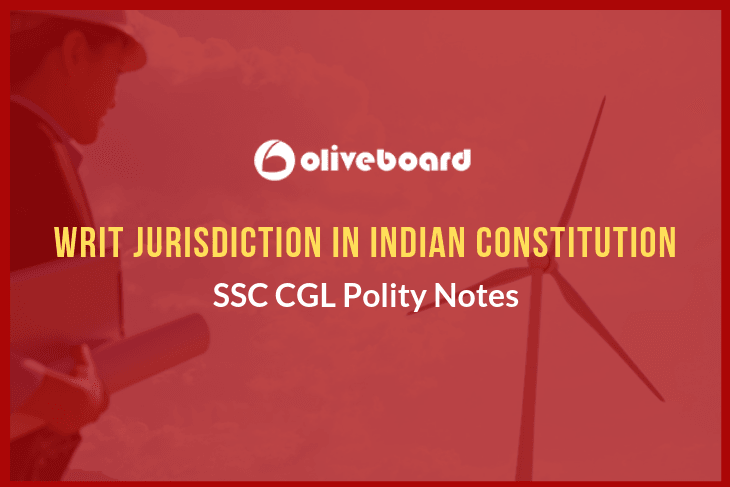The exam dates for SSC CGL 2018 has been announced in the recently released SSC Exam Calendar 2019. The SSC CGL Exam is going to be conducted from 6th to 19th June. This leaves the candidates to prepare for the SSC CGL exam a little over 3 months’ time. To help you with your preparation, we at Oliveboard are providing you with free SSC CGL Polity Study Notes in this blog. The topic which we are going to cover under this topic is Writ Jurisdiction In Indian Constitution in this edition of SSC Polity Notes.
SSC CGL POLITY STUDY NOTES – Writs in Indian Constitution
In the Indian Constitution this special power of Jurisdiction which can issue “entitlement of writ” is given to the Supreme Court and High Court of various States. Under the Act 32 of Constitution, the Supreme Court can issue writs for enforcement of Fundamental Rights which is applicable throughout the country, and under the article 139 and similarly under Article 266 for High Courts in the respective territory of the states.
Start a FREE MOCK TEST to solve Polity Questions for SSC CGL Exam
The Five Types of Entitled Writs are described as follows;
SSC CGL POLITY STUDY NOTES: WRIT OF PROHIBITION
The word Prohibition means “forbidding”. The Writ of Prohibition falls under the category when there is a case which does not fall under the jurisdiction of a lower court such as a tribunal or District Court, than the High Court takes the case under its jurisdiction to prevent it from exceeding over a longer period of time.
The Writ of Prohibition can only be issued on judicial authorities and not on administrative authorities, private bodies or legislative people.
SSC CGL POLITY STUDY NOTES: WRIT OF HABEAS CORPUS
The word Habeas Corpus means “litigation of a human body”. The Writ of Habeas Corpus is issued under the circumstances when a public or private corporation has to bring the body of the person who has been illegally detained along with the cause of detention in the summoned court. The person if found not guilty due to the detention being illegal is set free to go.
Start a FREE MOCK TEST to solve Polity Questions for SSC CGL Exam
SSC CGL POLITY STUDY NOTES: WRIT OF MANDAMUS
The word Mandamus means “ to be in command”. When a lower court or any public official fails or refuses to perform his or her duty, than the Supreme Court can issue the writ of Mandamus on the concerned person. However, the Writ of Mandamus cannot be issued on any private body.
Under this writ, the authorities only ask the existing task to be completed and compel the designated person to do the work.
SSC CGL POLITY STUDY NOTES: WRIT OF QUO WARRANTO
The word Quo Warranto means “ to issue a warrant”. This Writ of Quo Warranto can be issued by the court when a person claims to enquire the legality of a public office to prevent mishappenings or illegal use of resources of the office by the person. This writ cannot be conducted against any private body. The court wants to understand under what solid proof the person claims his issues.
Start a FREE MOCK TEST to solve Polity Questions for SSC CGL Exam
SSC CGL POLITY STUDY NOTES: WRIT OF CERTIORARI
The word Certiorari means “ to demand”. The Writ to Certiorari is one of the very important fundamental rights of the citizens. In some cases, the citizens are not satisfied with the judgements taken by the High Court or any lower court. In such cases, they can seek to go to the High Court with the intention of overruling the judgement of the High Court with proper evidence and documents.
That is all from us in this blog: SSC CGL Study Polity Notes – Writ Jurisdiction In Indian Constitution. We hope you found the information provided above a valuable addition to your SSC CGL Polity Study Notes. Keep visiting this space for more such free SSC CGL Polity Notes and Practice Questions. All the best for your SSC CGL Exam preparation.

The most comprehensive online preparation portal for MBA, Banking and Government exams. Explore a range of mock tests and study material at www.oliveboard.in

